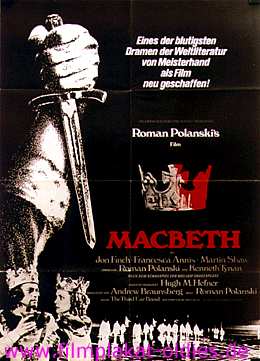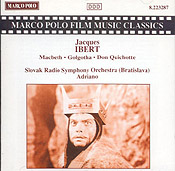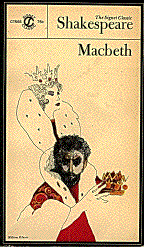Dr. Michael Delahoyde
Washington State University
MACBETH
ACT II
SCENE i
Late at night, Banquo harbors a slight anxiety, as he tells his son
Fleance, but his "cursed thoughts that nature / Gives way to in repose"
(II.i.8-9) remain unspecified.

|
He encounters Macbeth and the two verbally circle each other, Macbeth
testing him out and Banquo remaining evasive and noncommittal. Banquo
mentions the weïrd sisters, and Macbeth says, "I think not of them"
(II.i.21) -- a statement that seems must be a lie intrinsically, under
any circumstances. Macbeth suggests another future business meeting:
"when we can entreat an hour to serve, / We would spend it in some words
upon that business, / If you would grant the time" (II.i.22-24). He then
hints that they might be allies, to Banquo's advantage. Banquo
equivocally indicates that he's fine with that so long as nothing
compromises his honor: "So I lose none / In seeking to augment it, but
still keep / My bosom franchis'd and allegiance clear, / I shall be
counsell'd" (II.i.26-29). So Macbeth's subtextual overture doesn't work
and he immediately ends the encounter right there: "Good repose
the while" (II.i.29).
Macbeth now has his "dagger of the mind" apostrophe, an eerie
hallucination that points the way towards the King:
Thou marshal'st me the way that I was going,
And such an instrument I was to use. (II.i.42-43)
This is another instance of Macbeth's "vaulting," "o'er-leap[ing]" verbs.
An odd reference to taking "Tarquin's ravishing strides, towards his
design" (II.i.55). Tarquin is not a murderer but a rapist; so this
reference blurs sex and violence disturbingly. [There is later another
poetic echo of Lucrece, so perhaps these two works were written
near the same time.]
|
Of further linguistic interest, "'murder' is mentioned for only the second
time in the play. We may notice how hard he tries to avoid the word, to avoid
putting a verb to the noun, an action to the idea" (Garber 708).
"Macbeth displaces the agency from himself onto a personified 'murder,'
who resembles one of the witches ('withered') [II.i.52]. Subordinate clause
after subordinate clause postpones and retards the move to the verb 'Moves'"
(Garber 709).
A bell rings, presumably Lady Macbeth's signal that all is ready: "Hear
it not, Duncan, for it is a knell, / That summons thee to heaven or to
hell" (II.i.63-64).
SCENE ii
Lady Macbeth claims that "That which hath made them drunk hath made me
bold" (II.ii.1), referring to wine. She seems self-possessed momentarily,
but she's wrong. She jumps at every owl noise and confesses she could not
kill Duncan because the old man resembled her own father (II.ii.12-13) --
not all that bold.
Think how many are murdered onstage in Shakespeare, and reflect why we
are not allowed to watch Macbeth's stabbings of Duncan. The unseen nature
of the butchery allows us to imagine, rather horribly, the location and
number of Macbeth's thrusts into the sleeping body of the man who is at
once his cousin, his guest, his king, and symbolically his benign father.
(Bloom 531)
"A sorry sight" (II.ii.18) emerges: Macbeth with blood on his hands.
After their panicked, rapid-fire exchange, he whimpers that he couldn't
pronounce the word "Amen," but Lady Macbeth's attitude is "Consider it
not so deeply" (II.ii.27). Nevertheless, Macbeth now anticipates perpetual
insomnia: "Macbeth does murther sleep" (II.ii.33). Lady Macbeth is
paradoxically motherly (relatively so), but also calls him "Infirm of
purpose" (II.ii.49) and instructs him to wash while, due to his screw-up,
she clinically returns the daggers to the two guys they are framing for
the murder. She may have to smear them with more blood too: "I'll gild
the faces of the grooms withal, / For it must seem their guilt" (II.ii.53-54).
"Guilt is internal; gilt, external -- another equivocation" (Garber 711).
Macbeth hears "Knocking within," as does his wife when she returns. (Most
productions present the loud knocking, but it's possible that, at first,
the knocking is indeed "within." The dagger was an hallucination, and
best not represented on stage and in film, so the other senses ought to
be afflicted similarly.)
|
The dialogue between the Macbeths has been called "fast-paced ... like a
racing heartbeat, connoting anxiety and confusion" (Carey 374). They are
alternately grandly poetical and snippy. When Lady Macbeth returns with
blood on her hands, she claims, "A little water clears us of this deed; /
How easy it is then!" (II.ii.64-65), whereas Macbeth had just said, "my
hand will rather / The multitudinous seas incarnardine, / Making the
green one red" (II.ii.58-60). This Hamlet-like imagination seems to be
why Macbeth himself is the tragic figure here and that the play is not
titled The Macbeths (Goddard, II 114). By way of contrast, general
consensus is that "Shakespeare does little to individualize Duncan,
Banquo, Macduff, and Malcolm. The drunken porter, Macduff's little son,
and Lady Macduff are more vivid in their brief appearances than are all
the secondary males in the play, who are wrapped in a common grayness"
(Bloom 517).
|

|
Macbeth speaks the last lines of the gruesome scene, including, "To know
my deed, 'twere best not know myself" (II.ii.70).
SCENE iii
The famous and controversial Porter scene ensues, the only comic (some
think inappropriately so) scene in the play. A stock borrowing from
medieval "Harrowing of Hell" dramas, this character dramatizes his own
job into gatekeeper at Hell. He blabs about booze, but what he says
applies to other matters in the play if one acknowledge that you can be
drunk on many things: "it provokes the desire, but it takes away the
performance" (II.iii.29-30) -- another indirect connection between sex
and violence. He openly introduces the notion of equivocating also
(II.iii.8-11, 31, 35), and we get some lovely vomit wordplay (III.iii.41).
Macduff and Lennox need to see the King. While Macduff enters the
chamber, Lennox tells Macbeth about last night's omens: chimneys blown
down, screams, owls, slight earthquakes. The strained understatement,
"'Twas a rough night" (II.iii.61), is all Macbeth can say.
Macduff reports the murder, the bodily violation rendered in architectural
terms: "Most sacrilegious murther hath broke ope / The Lord's anointed temple,
and stole thence / The life o' th' building" (II.iii.67-69). "The Lord's
anointed" is also a phrase from 1 Samuel 26: 11-12 -- marked in de Vere's
Geneva Bible. Parallels to an earlier topicality trump the supposed James
connections:
As in the play, an ambitious rival assassinated Scotland's king [Darnley],
who had gone to bed thinking he was a welcome guest. Just as the play includes
a knocking at the porter's gate, investigative reports of Darnley's murder
twice mention a "knocking at the gate" -- while Bothwell was said to
have cried "Treason!" when informed of Darnley's murder. (Whalen 60)
Lady Macbeth is distressed that this took place "in our house." "Too cruel
any where," replies Banquo, perhaps taken slightly aback (II.iii.88).
Macbeth orates:
Had I but died an hour before this chance,
I had liv'd a blessed time; for from this instant
There's nothing serious in mortality:
All is but toys: renown and grace is dead,
The wine of life is drawn, and the mere lees
Is left this vault to brag of.
(III.iii.91-96)
Macbeth explains that he killed the two attendants in a rage of
"violent love" for his former king. [Two servants were killed along
with Lord Darnley, and two survived to give testimony (Ogburn and
Ogburn 797).]

|
Th' expedition of my violent love
Outrun the pauser, reason. Here lay Duncan,
His silver skin lac'd with his golden blood,
And his gash'd stabs look'd like a breach in nature
For ruin's wasteful entrance; there, the murtherers,
Seep'd in the colors of their trade, their daggers
Unmannerly breech'd with gore. Who could refrain,
That had a heart to love, and in that heart
Courage to make 's love known?
(II.iii.110-118)
"Macbeth speaks blithely and pictorially of his supposed discovery of Duncan's
body, describing that body almost as if it were a work of art" (Garber 711).
Perhaps he says too much, for with a "Help me hence, ho!" (II.iii.118), Lady
Macbeth faints (or feints!) -- it's unclear. [Asimov is sure she's faking (173).]
|
Duncan's two sons decide to flee the country one to England and one to Ireland,
since "There's daggers in men's smiles; the near in blood, / The nearer bloody"
(II.iii.140-141).
Banquo's line, "In the great hand of God I stand" (II.iii.130),
supposedly echoes "Il est un homme de dieu." Several Scottish women on
trial for witchcraft in 1591 explained that they had been instructed to
raise tempests by bounding cats to the severed joints of dead bodies and
tossing them into the sea. They asked the Devil why and were told that it
was to destroy James, for "Il est un homme de dieu" (Wells 283).
SCENE iv
"By th' clock 'tis day, / And yet dark night strangles the travelling
lamp" (II.iv.6-7). Rosse and an old man discuss more omens, including
horses that went berserk and cannibalistic last night (II.iv.14-17)!
Macduff is going home, not to Macbeth's coronation at Scone. Macduff
thus handily avoids taking any oath of loyalty to Macbeth, so there
will be no feudal qualms about honor if Macduff should decide to lead
a rebellion later (Asimov 176). On a historical note, the Stone of Scone
was probably a prechristian object of worship, later christianized and
then seized by England in 1296 and brought to London; it has served under
the coronation throne in Westminster ever since (Asimov 176).
Some productions make Rosse the third murderer in Act III, which would
mean he's a real hypocritical rat-bastard.
Act III
Shakespeare Index


